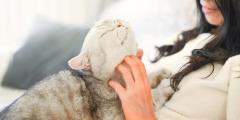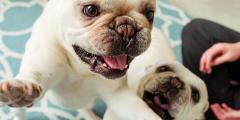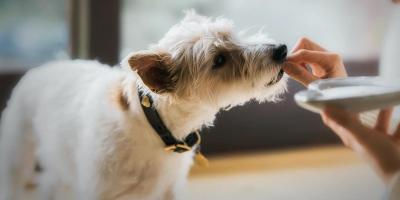
He's your bed bud, your stalwart companion, your favourite four-legged friend. He knows you inside out, and you'd do anything for him. Lately, though, he's been panting more than usual, and you're feeling a little concerned. Is it just a part of getting older, or is there something wrong with him? Why do dogs pant, anyway?
In this compact guide, we'll go over all the regular reasons dogs pant. Then, we'll talk about some less desirable panting problems, some of which might require veterinary attention. By the time you reach the final paragraph, you'll be a world-class expert on panting. Let's get started.
Why Is My Dog Panting?
Panting isn't usually a cause for concern. Let's look at three normal reasons why your pooch might pant on a daily basis:
He's Hot
Most of the time, dogs pant when they're too hot. Dogs can't sweat to cool down like we can — after all, he's dressed in a permanent fur coat. Instead, he pants to lose extra heat through his tongue. The shallow breaths he takes swiftly exchange warm air for cool external air. In turn, water evaporates from his tongue, from the inside of his mouth and from his respiratory tract, regulating his body temperature. In just a few minutes, he feels much cooler.
Mythbusting: Some people think that dogs can't sweat at all or that they don't have sweat glands. This isn't true. In fact, dogs can sweat a little through their paw pads — but not enough to keep them cool in hot weather.
He's Stressed
Dogs also pant as a stress response, or when they're feeling generally anxious or overexcited. This type of panting is called "behavioural panting." If he's pacing, whining, licking his lips, shaking, hiding or yawning repetitively as well as panting, he's probably feeling the pressure. Common reasons for this type of panting include travel, vet visits, fireworks and other scary or exciting things.
He's a Brachycephalic Breed
Flat-faced or brachycephalic breeds like pugs, boxers and French bulldogs are adorable, but they have a couple of unique traits their owners need to keep an eye on. If your fuzzy friend has a flat face, he probably has an anatomical condition called "brachycephalic obstructive airway syndrome" (BOAS). His bone structure means his upper respiratory tract is narrow, so he's more prone to breathing difficulties and may pant more than other dogs. Watch out in warm weather: Brachycephalic breeds aren't too great at cooling down, making heatstroke more of a risk in summer.
What Causes Excessive Panting?
If your pup is panting a lot, it's not too hot and you're sure he's not stressed, there might be something more going on. Listen to your dog's breathing: Is it raspy, louder or laboured? If so, give your vet a ring right away. Excessive panting causes include:
Heatstroke
One of the most common reasons dogs pant and don't stop is heatstroke. This is a serious issue, and it needs to be dealt with right away or your pup could get very ill indeed. Dogs with heatstroke pant heavily and often develop breathing difficulties. Other warning signs include:
- Fever
- Fast heartbeat
- Excessive thirst
- Glazed eyes
- Dark/bright red tongue and/or gums
If you think your dog has heatstroke, move him into a shady area immediately. You can prevent heatstroke by leaving your pup at home when the weather's hot (go for walkies earlier or later in the day) and by taking water with you for him to drink.
Golden Rule: Never, ever leave your pup in a hot car in summer time — especially with the windows shut. Doing so can be a fatal mistake.
Respiratory Problems
Respiratory issues like pneumonia often cause excessive panting. An inflammation of the lungs or lower respiratory tract, pneumonia usually stems from another respiratory infection. Additional pneumonia symptoms include a fever, breathing difficulties, lethargy and a nasty cough.
Pain
Dogs are exceptionally good at hiding pain. Sometimes, panting excessively is the only clue they give their owners. If your dog is panting at night and you think pain might be the problem, make an appointment at the vets.
Cushing's Disease
Cushing's disease happens when a dog's adrenal glands release too much cortisol. If your pup's panting is caused by Cushing's, he'll probably also be very thirsty, gain weight, grow a pot belly and develop thinner skin.
Allergies
Have you recently given your pooch a new medication or a new type of food? Interestingly, allergies can also cause excessive panting. He may also vomit, sleep a lot and struggle to breathe. Severe allergic reactions warrant an emergency trip to the vet.
Obesity
If your pal is a bigger-than-average pup, he might have trouble getting enough oxygen. He might pant a lot, and he may also struggle in other ways. Obesity in dogs can lead to heart failure, arthritis and a reduced lifespan, so speak to your vet about weight-loss strategies.
Heart Problems
Some dogs with heart issues pant almost constantly — whether they're active or not. They may also cough, and they'll probably feel extra-tired all the time. If you think Fido has a heart condition, take him in for a full assessment.
Why Is My Dog Panting at Night?
Excessive panting at night has many causes, some of which aren't immediately obvious. If he's a puppy or young dog, he might have separation anxiety. If you think that might be the case, try leaving a radio on to see if it helps. If your furry friend still pants a lot at night and you can't think of any reason why, you should probably take him to see your veterinarian.
The Panting Wrap
There he goes, big tongue lolling out of his mouth, taking rapid, shallow breaths — and looking adorable. He's panting again. But why do dogs pant? Most of the time, dogs pant for completely benign reasons. Sometimes, though, excessive panting does indicate a problem. If you think your pup is panting too much, give your vet a call to be on the safe side.
Related articles



